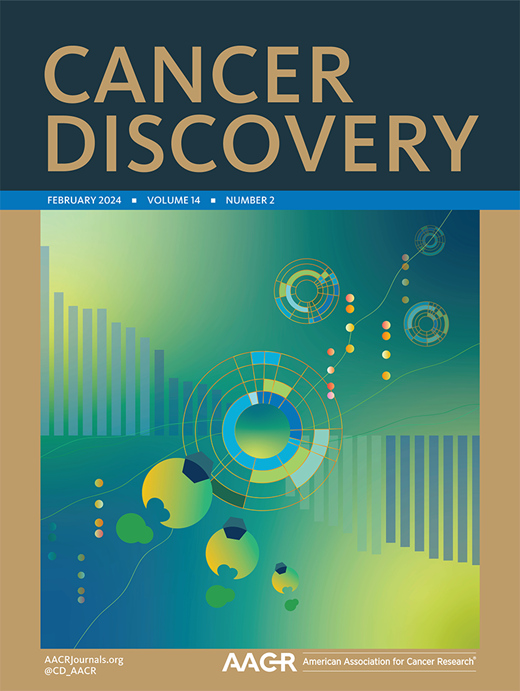胆道肿瘤细胞系图谱的生成确定了分子亚型和治疗靶点
IF 29.7
1区 医学
Q1 ONCOLOGY
引用次数: 0
摘要
胆道癌(btc)是侵袭性恶性肿瘤,包括肝内和肝外胆管癌、胆囊癌和壶腹癌。在这里,我们报告了63个BTC细胞系通过多组学和基因组级CRISPR筛选的综合分析。我们确定了BTC中广泛存在的EGFR依赖性,以及对解剖亚型选择性的依赖性。此外,我们描述了克服治疗耐药的策略,结合EGFR抑制增强靶向kras突变体和fgfr2融合驱动模型,以及SHP2抑制在后一种情况下有效。聚类RNA/蛋白表达和依赖性数据显示功能关系超越单基因改变,胆道、鳞状或双胆道/肝细胞谱系特征分层BTC模型。这些亚型分别表现出不同的依赖性,包括细胞命运转录因子GRHL2、TP63和HNF1B,并在患者样本中显示出预后意义。潜在的亚型特异性靶向漏洞包括整合素a3和解毒酶UXS1。该细胞系图谱揭示了分子定义的btc的治疗靶点,揭示了疾病亚型,并为治疗开发提供了资源。本文章由计算机程序翻译,如有差异,请以英文原文为准。
Generation of a biliary tract cancer cell line atlas identifies molecular subtypes and therapeutic targets
Biliary tract cancers (BTCs) are aggressive malignancies encompassing intrahepatic and extrahepatic cholangiocarcinoma, gallbladder carcinoma, and ampullary carcinoma. Here, we report integrative analysis of 63 BTC cell lines via multi-omics and genome-scale CRISPR screens. We identify widespread EGFR dependency in BTC, alongside dependencies selective to anatomic subtypes. Additionally, we delineate strategies to overcome therapeutic resistance, with combined EGFR inhibition potentiating targeting of KRAS-mutant and FGFR2-fusion-driven models, and SHP2 inhibition effective in the latter context. Clustering RNA/protein expression and dependencies data revealed functional relationships transcending single-gene alterations, with biliary, squamous, or dual biliary/hepatocyte lineage signatures stratifying BTC models. These subtypes exhibit distinct dependency profiles— including cell fate transcription factors GRHL2, TP63, and HNF1B, respectively— and demonstrate prognostic significance in patient samples. Potential subtype-specific targetable vulnerabilities include Integrin-a3 and the detoxification enzyme UXS1. This cell line atlas reveals therapeutic targets in molecularly-defined BTCs, unveils disease subtypes, and provides a resource for therapeutic development.
求助全文
通过发布文献求助,成功后即可免费获取论文全文。
去求助
来源期刊

Cancer discovery
ONCOLOGY-
CiteScore
22.90
自引率
1.40%
发文量
838
审稿时长
6-12 weeks
期刊介绍:
Cancer Discovery publishes high-impact, peer-reviewed articles detailing significant advances in both research and clinical trials. Serving as a premier cancer information resource, the journal also features Review Articles, Perspectives, Commentaries, News stories, and Research Watch summaries to keep readers abreast of the latest findings in the field. Covering a wide range of topics, from laboratory research to clinical trials and epidemiologic studies, Cancer Discovery spans the entire spectrum of cancer research and medicine.
 求助内容:
求助内容: 应助结果提醒方式:
应助结果提醒方式:


